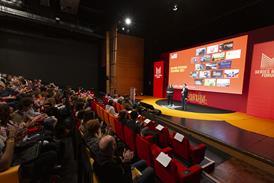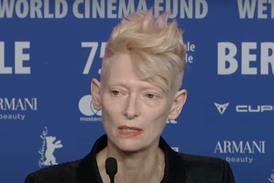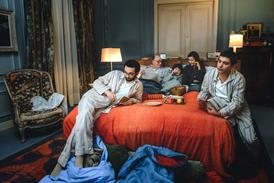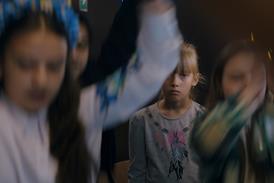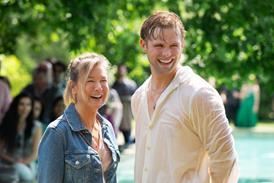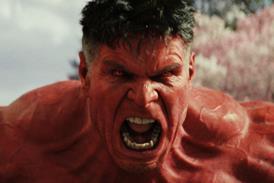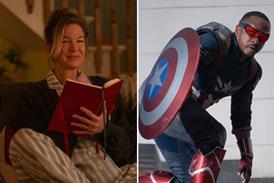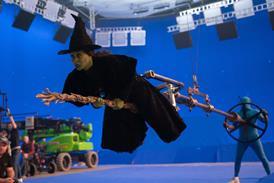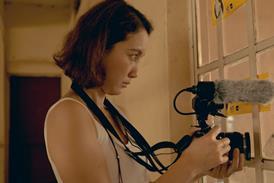Two estranged brothers reconnect through fencing in this sharp Taiwan-set ’sophisticated genre piece’
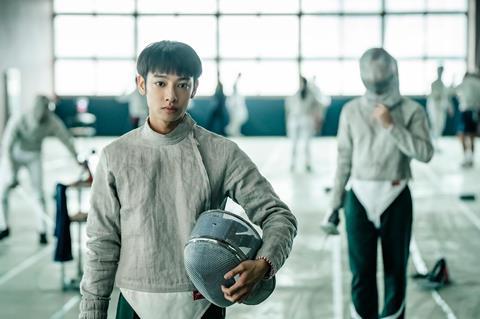
Dir. Nelicia Low. Singapore/Taiwan/Poland. 2024. 109 mins
Brotherly love is the focus of Singaporean filmmaker Nelicia Low’s Taipei-set debut feature Pierce, in which estranged siblings are reunited after years apart. That may sound like the premise for a heart-warming drama, but Low is burrowing into darker territory: the elder brother is a recently released juvenile offender who may very well be a violent sociopath, while the younger has a worrying tendency to idealise their childhood. But what gives Pierce an unnerving frisson is the brothers’ mutual enthusiasm for fencing which results in some literally pointed encounters. With its intricate clashing of sabres and emphasis on rigorous strategy, this lightning-fast sport proves to be an incisive metaphor for how they come to anticipate one another’s moves, even when their entanglement goes beyond the mat.
The pressing physical and mental dynamics of the combat sport are truly brought to the fore
Playing in the Crystal Globe Competition at Karlovy Vary, Pierce tells a gripping story in a coolly stylish fashion and should make its mark on the festival circuit without breaking a sweat. This is a classy package which comes with considerable art-house cachet: the credits of its various producers include Pham Thien An’s Inside The Yellow Cocoon Shell (2023) and Amanda Nell Eu’s Tiger Stripes (2023), while sound designer Tu Duu-chih is renowned for his collaborations with such luminaries as Hou Hsiao-hsien and Wong Kar-wai. Its core strength, though, is the narratively fleet yet psychologically layered screenplay from Low (herself a former national fencer), which ensures that Pierce plays as a sophisticated genre piece. Further engagements at prominent events are likely to follow, as is keen interest from leading specialty distributors and high-end streamers.
Young fencer Jie (Liu Hsiu-fu) aspires to follow in the footsteps of older brother Han (Tsao Yu-ning) – albeit not too closely. Han was a three-time national champion who killed an opponent with a broken blade. Despite claiming that it was an accident, Han ended up in juvenile prison. Forbidden from visiting Han by their mother Ai Ling (Ding Ning), Jie holds fond memories of his brother regardless of her insistence that he was always a bad apple.
When Han is granted early release after seven years, Jie considers reconnecting. But it’s a masked Han who makes the initial overture by sneaking into Jie’s fencing class for a duel. Soon, Han is playing mentor by honing Jie’s fencing skills and advising him on how to romance sensitive teammate Hui (Rosen).
Han’s reappearance also impacts Ai Ling, who has tried to move on from the shame of Han’s conviction and also the loss of her husband to cancer. She makes a living as a nightclub singer and has attracted a charming suitor in fellow widower Zhuang (Lin Tsu-Heng). However, the story she has crafted to explain Han’s absence may not hold water now he is back on the streets of Taipei.
Pierce is the second family-themed psychological thriller of the year to feature competitive junior fencing following Lin Jianjie’s Brief History Of A Family, but here the pressing physical and mental dynamics of the combat sport are truly brought to the fore. After ingeniously fusing a plethora of techniques to create a donkey’s perspective in Jerzy Skolimowski’s experimental head-scratcher EO (2022), cinematographer Michal Dymek operates in classical mode here. The fencing matches are captured through fluidly elegant pans which underline how especially confident opponents set the tempo, and emphasise the power that Han exerts over Jie. Dymek’s closer coverage is precisely cut by Low and Eric Mendelsohn to convey the force of lunges and instil the paranoia that can stem from not knowing who is behind the other mask. Many of the duels evince a heightened realism that is enhanced by Tu’s rattling sound design and Piotr Kurek’s discordant score.
Low demonstrates a sure hand throughout, and finds space for compassionate character moments without lessening the slow-burn tension. These include Jie’s tentative courtship of Hui and the efforts made by Ai Ling to draw a line between past and present, which are movingly etched by an excellent Ding. Low also shows how emotions are strongly shaped by subjective recollection. A scene in which the cheerfully intoxicated brothers bound through rainswept streets to Neil Sedaka’s evergreen ’Oh! Carol’ while being juxtaposed with a flashback to their younger selves has an ironic sting, since it recaptures a childhood that may not have been so joyous. In addition, haunting flashbacks to a significant incident are presented in a grainy palette that suggests memory is unreliable – or even maleable, if the individual is so inclined.
In dramatising these mind games, a compellingly impassive Tsao nails Han’s manipulative streak – as well as with his brother, he also knows just what buttons to press when dealing with his case worker or in social situations. However, it’s Jie who embodies the central conflict of fantasy vs. reality as he engages in a high stakes inner duel: is Han the innocent, supportive brother that he has always wanted or does he pose a threat to society?
Wholly emphatic newcomer Liu does well to portray how Jie is wracked with doubt, especially as matters come the boil at the national fencing tournament. The manner in which Low ultimately resolves Jie’s dilemma constitutes a shocking turn which may seem to come out of left field but, upon reflection, is entirely consistent with the film’s complex psychology.
Production Company: Potocol
International sales: Magnify, international@magpictures.com
Producers: Sam Chua Weishi, Jeremy Chua, Patrick Mao Huang, Izabela Igel, John M. Lo
Cinematography: Michal Dymek
Production design: Marcus Cheng, Hsu Kuei-Ting
Editing: Nelicia Low, Eric Mendelsohn
Music: Piotr Kurek
Main cast: Tsao Yu-Ning, Ding Ning, Liu Hsiu-Fu, Rosen, Lin Tsu-Heng




